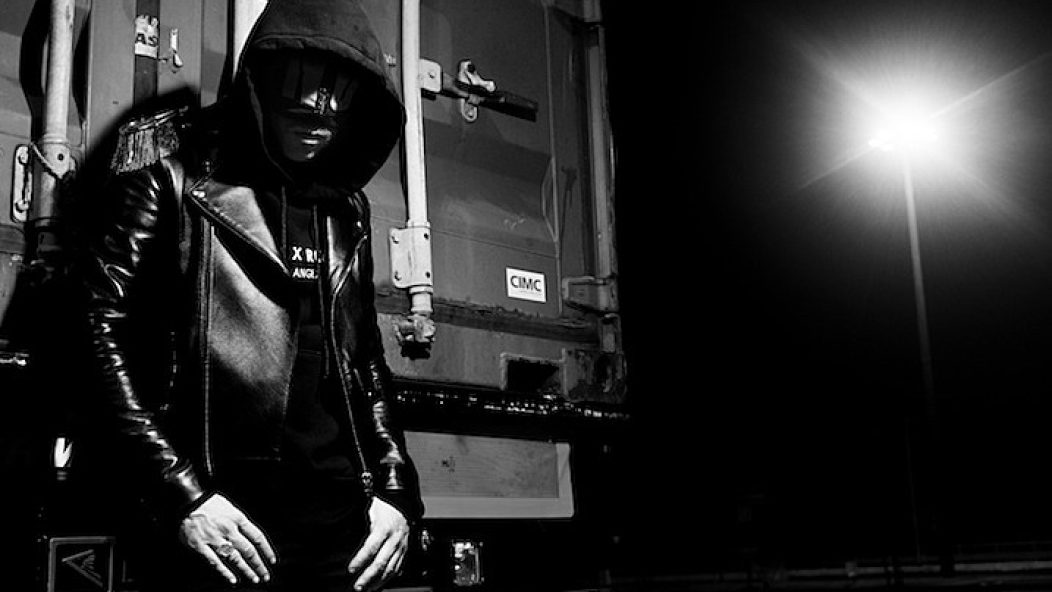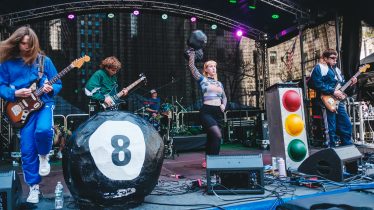
Bloody Beetroots, Jason Aalon Butler talk ‘TGES’: “I think [the record] is quite punk-rock”
[Photos by: Mauro Maglione]
It was time for Sir Bob Cornelius Rifo—the constant of electronic dance/rock act the Bloody Beetroots—to make a new record full of mayhem soundtracks and other avenues of electronic cool. But like anybody seeking to expand their craft, he wanted to do something way different. For the new BB album, The Great Electronic Swindle, Rifo went through his phone book and reached out to people to contribute vocals. Rifo admits to not being as adept with wordplay as he is with creating captivating electronic tracks, but he was able to put together an A-list of alt-rock personalities to put words to his creations. The album boasts contributions from Aussie rockers JET, Maskarade, Rival Sons’ Jay Buchanan (a big catalyst for the project), Jane’s Addiction founder Perry Farrell, deadmau5 collaborator Greta Svabo Bech, In Flames’ Anders Friden, Eric Nally (ex-Foxy Shazam), Gallows, Crywolf, Leafar Seyer (from cholo-goths Prayers), Mr. Talkbox, Deap Valley and Jason Aalon Butler, the former letlive frontman currently fronting the Fever. This Rogues Gallery of performers have found a commonality in Rifo’s electronic constructions, whether they were sonic calls to riot or high-kicking club tracks.
Read more: letlive/the Fever’s Jason Butler lends vocals on violent Bloody Beetroots song, “Crash”
The Great Electronic Swindle gets its title referring to the Sex Pistols movie The Great Rock ’n’ Roll Swindle, which may make some people scratch their heads about what Rifo is trying to convey. Others like Butler already get it. “By virtue of what it is in its environment currently—and especially since I’m talking to AP—I think [the record] is quite punk-rock,” says the Fever frontman, whose contribution to the album, “Crash,” is a sonic phosphorous bomb. “Honestly, a lot of times when I hear a band onstage, I don’t think they are honestly as angry or extreme as they they are portraying. Bob, being one of the sweetest souls I’ve ever met in music, I believe him. He believes in that subversion and that pushing against the grain. I don’t give a fuck how you want to dress that up: That’s punk rock. What I want people to take away from ‘Crash’ is that Bob is an artist. That word has been crudely misshaped over the years. The artists that have been praised over the last decade and a half, I don’t believe in a lot of them. I’m not telling people what they should or shouldn’t believe in. But if you give a fuck about what I say, you should know that Bob is an artist to believe in.”
“[Sir Bob Cornelius Rifo] believes in that subversion and that pushing against the grain. I don’t give a fuck how you want to dress that up: That’s punk rock.”
Jason Pettigrew spoke with Rifo about his desire to finally use words on a Beetroots LP, how collaboration was the ultimate manifestation of friendship, the crucial input of Rival Sons’ Buchanan and what separates Italy’s cultural climate from America. Slightly.
On this album, were you trying to reflect hip-hop culture where plenty of artists make appearances on each others records? Perhaps trying to create an old-school ’80s-’90s mixtape vibe? Or something else entirely?
Really, the intention was to tell a story. I listen to so much music every day, but I’m not a good speaking person. So I called up some of my friends and asked, “Do you want to talk about your last four years?” and we did that.
You have quite a bunch of friends. I can’t imagine these people sitting next to each other at a dinner party, but it’s quite cool hearing them on the same record. The record is so diverse in both contributors and your writing styles.
Really, the key element is the common denominator. Making this record, I wanted to do things upside-down: create the music first and then the electronic [elements], just because it fits better in this scenario.
There are so many subgenres and subcultures in today’s electronic music world. Is there one style or genre you simply do not like?
Hmm… [Pauses.] I don’t think I hate any genre of music because I just consider music as music [and not as genres]. I’m a big fan of good music. If it fits, why not? I don’t think I hate any electronic subdivision at the moment. I just hate cheap electronic music—which is why I called the record The Great Electronic Swindle. Now that electronic music has become the new pop, many acts around the world have really threatened the genre. I want to take the position that electronic music deserves a better position in the world. So I wanted to make a good record and try to be as honest as possible.

It feels like the tracks you gave people to work on had a certain kind of specificity to them, with attention to their performance, skills and overall vibe. It’s a record made by someone who has studied the nuances of the idioms, as well as those of the collaborators.
I completely agree with you. I guess the secret was the empathy I created with each person that helped make the record. We always talk about the power of an emphatic relationship, but that creates the magic. If you are honest with the people that are in front of you, then you are able to create something completely beautiful and true. It doesn’t matter if people like my music or not: I’m satisfied because of the relationship I’ve created with all of my friends in making something really solid. To tell those stories, we needed to talk a lot to deliver something that was profound and with heart and soul. We talked about the stories being told and did we have a common experience to deliver.
Perry [Farrell] and I had talked four years ago about doing something. On “Pirates, Punks And Politics,” we talked about how to make music that was consistently revolutionary: How can we make a commentary on the state of electronic music, but more importantly, the state of our current culture in our community? So that was our work: how to make something that could possibly bring about change or at least get people to think. We discussed that for days. With Jason Butler, the approach was different. We wanted to explore the commitment in a relationship between a man and a woman and explain the power of a fight between the couple.
“If you are honest with the people that are in front of you, then you are able to create something completely beautiful and true.”
Were there any situations where, after hearing some of the words that were being written or sung, that you said, “No. Absolutely not,” whether it was philosophically incorrect or simply a bad lyric?
Not really. The key is to keep talking and share your views and then you end up right in the middle—and the middle is what works. I care about melodies and harmonies; in terms of words, I always care about the point of view of another person. I said to everyone, “Let’s hear your point of view to the story. You’ve got my thoughts, my music and my way of thinking. Let’s meet in the middle and see what happens.” I never told anyone what words not to use.
Is there one shared characteristic that all of your collaborators have that might not be noticeable to people listening to the record? Would all these people hang out with each other besides making Bob’s record?
I think so. I would always say things like, “You should really meet Jason” or “You should meet Perry.” [Laughs.] I think they all have the same thing in common. All of these people are experimenters of the human condition: They are delivering the kind of empathy that touches people.
Rival Sons’ Jay Buchanan played a big role in the making of Swindle.
He completely changed my life. We spent three days together recording “Nothing But Love.” It was a pretty mystic experience because Jay really wants to get in deep with whatever it is you want to express through music and really takes the journey seriously. He changed my life in three days. He made me think about how to express myself differently. I’m a pretty free person, but through Jay I gained a different kind of freedom, one where I could express my feelings. I was writing and composing some cool electronic music, but never something that could touch people so profoundly and deeply. This is the first time on a Bloody Beetroots album where I’m using words and lyrics. In a way, Jay gave birth to the album, confirming that I was doing the right thing for myself.
“[Rival Sons’ Jay Buchanan] changed my life in three days. He made me think about how to express myself differently.”
This is a pretty ambitious record that works on so many levels. It may be too early, but who cares: What’s next?
Maybe some classical music? [Laughs.] There will be a short tour. After that, I don’t know. I’m just going to continue on this journey and go out and make new friends. I’m pretty happy with the results after breaking the rules, living my life and expressing it through music.
You’re in Bassano del Grappa in northern Italy. I’m sure you’re well-aware of the political and social upheavals in America currently. What’s it like where you are?
It’s a pretty similar situation as America but a little better. Because at least we can have the good food. [Laughs.]









